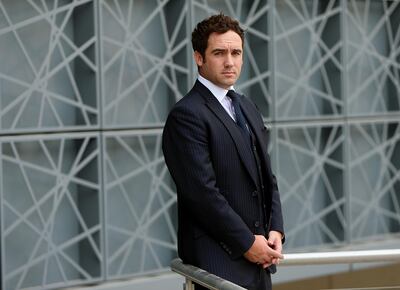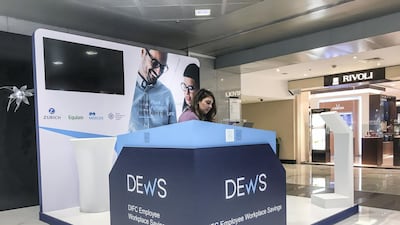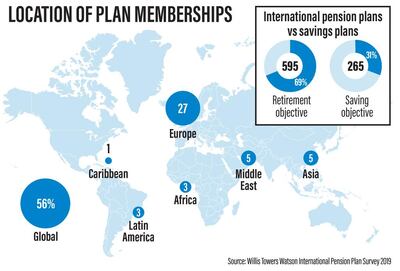Only 5 per cent of 932 international pension and savings plans have memberships in the Middle East, according to the latest International Pension Plan Survey from global risk advisory firm Willis Towers Watson.
But that looks set to increase in the coming years — specifically in the UAE — with recent indications the existing end-of-service gratuity system is ripe for an overhaul and the introduction of Dubai International Financial Centre’s Employee Workplace Savings Plan (Dews) on February 1.
The Dews plan, which requires employers to make monthly contributions to a centrally administered investment fund, is highlighted in the Willis Towers Watson report as representing "a substantial departure from the current employer mandate" and effectively creating "one of the very first retirement/savings funds for employees in the UAE”.
“Because of the DIFC changes, a lot of companies that operate out of the UAE are seeing that as a catalyst to look at pensions and retirement savings and IPPs [international pension plans] if they have one — or possibly introduce one,” says Michael Brough, director in Willis Towers Watson’s Global Services and Solutions, and developing and emerging markets leader for the firm.
This could have reverberations on a federal level in the UAE and the rest of the Gulf countries, where an end-of-service gratuity, rather than retirement savings or a pension plan, is the norm.
The IPP survey found “significant interest” in pension and savings plans for Middle East populations in 2019. On a global level, assets under management of the 877 companies with 932 plans in the study rose to $15.8 billion (Dh58.03bn) last year from $14.7bn in 2018. About 70 per cent of plans had a retirement objective and 30 per cent a savings objective.
The current gratuity system
The UAE’s end-of-service gratuity pays employees a lump sum based on the length of employment. Employees with at least 12 months’ service are entitled to 21 calendar days’ salary for each year of service in the first five years of employment and 30 days’ salary for each year of service worked beyond five years.
Similar systems are mandated throughout the Gulf. In a separate December survey from Willis Towers Watson on End of Service Benefits in the Middle East, 77 per cent of the 323 organisations said they provide such benefits in their Middle East locations. The majority of the companies surveyed were in the UAE, followed by Saudi Arabia, Egypt, the four other GCC countries and a smaller number in the Levant and elsewhere.
However, the UAE is now leading the way in examining alternatives to more closely align with global standards in long-term retirement and savings plans. Last March, at the End of Service Benefits Conference in Dubai, Abdulrahman Al Awar, director general of the Federal Authority for Government Human Resources, said studies are being carried out to enhance and improve the system to help companies attract and retain talent.
DIFC's Dews plan
Meanwhile, The National reported in March the DIFC's plans to replace end-of-service gratuity with a new savings scheme. The Dews plan, which went live on February 1, requires employers to contribute an amount equal to 5.83 per cent or 8.33 per cent of an employee's wage, depending on length of service, on a monthly basis to a trust-administered fund.
Equiom is serving as the trustee, Swiss insurer Zurich Middle East as the administrator and global consultancy Mercer as the investment adviser. The targeted returns for the Dews plan range from 2.5 per cent and 6.8 per cent, while the fees are between 1.26 and 1.33 per cent, according to Mercer. Employees can choose from five risk-profiled funds and can also make voluntary contributions.
All 2,400 DIFC-registered companies must enrol in the Dews plan, or a “qualifying alternative” scheme, by March 31. However, the tight deadline has given little time for companies to apply for a licence for qualifying alternative schemes and get approved.
“There might be an uptick of activity between now and December when a lot of alternative schemes will probably pop up,” says Mr Brough.
The Dews effect
Dews will certainly spur competition in the market, with some providers already applying for a qualifying alternative scheme certificate at DIFC. However, to date no qualifying alternative has officially been approved.
Although the DIFC has touted the 1.33 per cent Dews fees as economical compared to retail options on the market, Mr Brough says workplace state pension schemes, such as Nest (National Employment Savings Trust) in the UK, are cheaper.
“We did analysis over a 20-year period and found that Dews is three times more expensive than Nest over that 20-year period for an average population that you might see in the DIFC,” Mr Brough says.
Nest members pay a 1.8 per cent charge on contributions plus a 0.3 per cent annual management charge on their total pot, which is broadly equivalent to a 0.5 per cent annual charge for most types of savers, according to the Nest website.
"The cost of the Dews plan is relatively cheap considered from a global perspective and this has been confirmed by a detailed benchmarking exercise done prior to the introduction of the Dew plan," Jacques Visser, chief legal officer at the DIFC Authority, told The National.
“Retail products out in the market can have hefty fees that can exceed 8 per cent per annum with penalties for early exits, et cetera."

Potential for change in the UAE
Mr Brough says Dews will be seen as an experiment for the rest of the UAE. “The federal authorities will be looking at IPP markets [and] they’ll be looking at Dews in terms of its success and to learn from it,” he adds.
The UAE has recognised the need for change for several reasons. Firstly, three quarters of companies in the Emirates do not set aside specific assets for end-of-service benefits, according to a November Zurich survey. This puts employees at risk, as their benefits are paid from cash flow.
Secondly, the gratuity system was meant as savings for expatriates who are in the country on a short-term basis, but that profile has changed in recent years. About 40 per cent of employers said they expect their employees to stay with the company five to 10 years on average, according to the December Willis Towers Watson Middle East survey.
“End-of-service was historically a repatriation tool really for people who came for a year or two. The money was enough to get them home. People are now here for, in many ways, their career,” says Daniel Dickinson, senior executive officer of PraxisIFM Trust UAE, which is based at Abu Dhabi Global Markets (ADGM).
Praxis received its ADGM license in 2016 and has been working with Mubadala Investment Company, Abu Dhabi’s strategic investment arm, to restructure its end-of-service benefits. As a start, the liabilities have been placed in “six deposits with two very large Abu Dhabi-based banks”, Mr Dickinson says.
“The idea would be that slowly we start to invest that in slightly riskier asset classes and eventually we would look to give the employees the ability to contribute to the scheme as well by way of a savings scheme,” he says.
Praxis is in discussions with other entities in the UAE, as well as in other Gulf countries — although “they are a long way behind the UAE in terms of doing anything”, Mr Dickinson says.
It may be too soon to see significant developments on a federal level this year, but Mr Brough anticipates changes “beginning of next year or slightly later”.
“There is a lot of enthusiasm for change,” he says.



